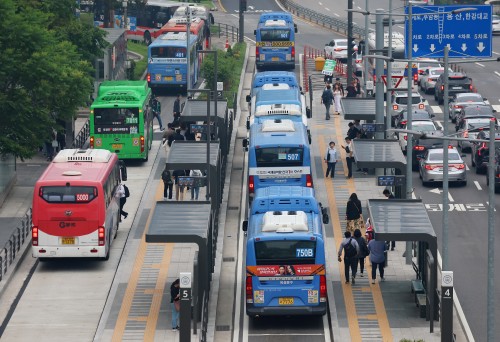 |
| (Photo / Yonhap News) |
The Seoul city bus union has decided to postpone a planned strike, despite a breakdown in last-minute negotiations over wage and collective bargaining agreements. The decision came just hours after the union had declared a strike following a failed marathon round of talks.
According to labor officials on May 28, the Korean Confederation of Trade Unions-affiliated Seoul City Bus Workers’ Union held an emergency vote at its office in Yongsan District around 2 a.m. Of the 63 members present, 49 voted to postpone the strike, while 11 supported continuing it and 3 abstained.
As a result, buses that were scheduled to stop operating from the first shift on May 28 will now run normally.
The union and management had engaged in a final round of talks for over nine hours at the Seoul Regional Labor Office on the afternoon of May 27, but negotiations collapsed at 12:10 a.m. with no agreement reached. The union initially declared a strike beginning with the morning’s first buses, but reversed course shortly thereafter.
A union official explained, “We determined that going on strike wouldn’t change the stance of either the Seoul city government or the employers. It would be meaningless. Instead, we’ll focus on legal and administrative channels to secure our rights, and resume talks once the city and management can no longer rely on unreasonable claims.”
The union is also awaiting the outcome of a long-running lawsuit regarding ordinary wage calculations at Dong-A Transportation. “If the appellate court rules that bonuses count as ordinary wages, it will effectively amount to a wage increase. Even if the case goes to the Supreme Court, we expect a swift ruling,” the official said.
In a notice to members after the decision, the union added, “Once a new central government and labor minister are appointed, the recognition of overdue wages stemming from the inclusion of bonuses in ordinary wages will be secured more swiftly. This will clarify that the issue of legal rights and collective bargaining should be treated separately, preventing the city and management from disputing it.”
At the heart of the negotiation breakdown was the definition of “ordinary wage.” Management has argued that fully accepting the union’s demands—including recognizing regular bonuses as ordinary wages—would effectively result in a 25% wage hike. They have proposed restructuring the wage system to offset the increase. The union, however, insists that the definition of ordinary wage is a legal matter and not subject to negotiation.
Despite intensive talks, the two sides could not bridge their differences.
The Seoul Bus Transport Business Association, representing management, welcomed the strike suspension in a statement: “We sincerely appreciate the union’s decision. We will do everything we can to ensure safe transportation for citizens starting with the first buses today.”
The association also expressed its intent to resume negotiations promptly and reiterated the necessity of wage system reform.
However, given the scale of disagreement between the parties, observers expect a long road ahead before any agreement is reached.
Meanwhile, the Seoul city government said it would cancel its emergency contingency plan for bus service disruptions. Yeo Jang-kwon, head of the city’s transportation bureau, stated, “We are relieved that the strike has been suspended, minimizing commuter disruption. The city remains prepared to respond swiftly in case of any unexpected union actions to prevent inconvenience to the public.”
Most Read
-
1
-
2
-
3
-
4
-
5
-
6
-
7





















